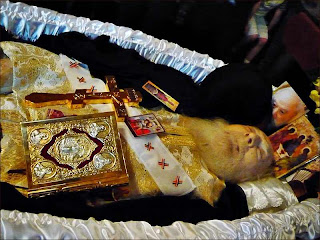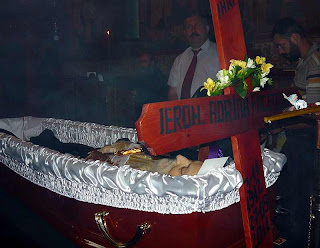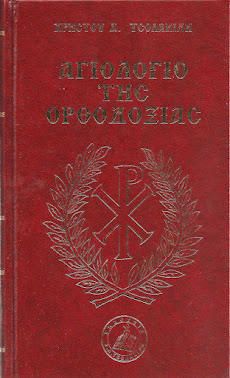
WEAPONS AGAINST SATANIC INFLUENCE
by Archimandrite Vasilios Bakoyiannis
The Cross:
In Thrace, Greece, Christians and Muslims live together in harmony. There was once a good, well-intentioned shepherd who was a Muslim, and, on comparing the religion of Muhammad with Christianity, he came to the conclusion that Christianity was much better than Islam. His interest in Christ increased all the time. He began to talk, to study, and to ask about Christianity. Finally he decided to renounce Islam and become a Christian. His father learned about it and did his best to change the young man’s mind. He was unable to do so, though, because his son was convinced that his decision was correct. In desperation the father decided to ask for the help of an occultist. “I want you to stop my son from thinking about Christ,” he told him. The sorcerer, certain of his success, set to work.
He failed the first time and so he tried again. He failed again. He tried a third time and again he failed. Then he realized what was hindering his efforts. He called the father and told him directly, “If you want the magic to work, tell your sons to get rid of those bits of wood that he wears around his neck.”
What was it? The young Muslim had seen that Christians wear crosses around their necks and so he did the same. He took two pieces of wood, arranged them into the form of a cross and wore it around his neck. And thanks to that makeshift cross, which the devil fears, the magic didn’t work upon him.
Relics:
The Emperor Julian, the Apostate, went to a famous sorcerer at the oracle of Apollo in Daphne, Antioch. But right next to the oracle was a cemetery where there were the relics of the holy martyr Babylas. Because of the presence of the Saint’s relics the sorcerer could not speak. He then told the Emperor, “If you want me to tell you your fortune, you will have to remove the relics of St. Babylas because his presence is what is keeping me from speaking.”
Prayer and Fasting:
We have seen how fasting and prayer can put the devil to flight. We will do no more here than note the following: The race of demons, says the Lord, is defeated by prayer and fasting. Fasting has to do with the body; prayer has to do with the soul. So the whole person engages in the struggle against the devil.
Let us dwell a little on prayer. I would remind you of the famous sorcerer who went to Kolwezi in Zaire in 1984 and set about curing people of their afflictions. Fr. Meletios, the missionary priest from the Monastery of Gregoriou on Mt. Athos, who was an eye-witness to the following events, tells us want happened there. In October, 1994, the sorcerer returned to the same town, preceded by an extensive publicity campaign. Banners were stretched over the main streets and loud speakers announced his arrival. They said that the Savior is returning. They had also set up a platform on one of the main roads where the sorcerer would stand. Lots of people hastened to make their way there to present themselves before him in order to regain their health. The savior arrived. There was pandemonium. His timetable was such that he would remain in the town for a whole week.
On the first day he went to the platform to heal the sick that were waiting anxiously. He said his prayers but nothing happened. Three hours went by and still there were no healings. On day two, he said his prayers again. But again he had nothing to show for them. Meanwhile, the loudspeakers on the street continued to announce his presence in the town. On the third day, he still had nothing to show for his efforts. The people began to feel uneasy. On day four, there was still nothing happening and the people began to get angry.
But all hope was not lost because there were still three days left. He did everything he could, but still without affecting any result at all. And then, on the last day, overwhelmed with confusion, he was forced to admit to the disappointed crowd that this was the first time that anything like this had happened to him and that it had happened there in Kolwezi. Well, what really happened?
Fr. Meletios, the Orthodox missionary, had not been idle. He had used the visit of the sorcerer as an opportunity to shame the devil, to demonstrate the power of the Orthodox Church and to glorify God. Every time the shaman mounted the platform to do his thing, Fr. Meletios and all the Orthodox Christians gathered in the Church of St. George and chanted the Supplicatory Service to the Mother of God, and then read the prayers of exorcism of St. Basil the Great. In confessing that this was the first time that anything like this had happened to him, the famous shaman did not know that he was being opposed by the spiritual weapons of the Orthodox Church.
Those Who Live a Sacramental Life:
Holy Unction:
A priest friend of mine told me the following story: A parishioner of his had his suspicions that evil spells were being cast upon him. So he asked a priest to come to his home and perform the Holy Unction service. A few days later, they met on the street and he said to him. “Father, the Holy Unction worked! We have discovered that when you were saying the service, a witch started shouting that some priest was binding her hands.” So the sacraments are also weapons against magic.
Confession:
Confession is a very great weapon against magic. The devil himself tells us. “I’m afraid of that bath that the Christians have in Church.” “Never go to confession,” he said himself at a sorcerer’s convention.
Holy Communion:
“The thing I am frightened of most of all,” said the devil, “is what the Christians eat and drink in Church, so long as they do so with a clear conscience.” Holy Communion is the most deadly weapon against magic. So if you take Holy Communion, magic will not affect you. The conclusion to this is that if you distance yourself from sin and live in the Church with its sacraments, you have nothing to fear! You will never, never be attacked by magic.
Who Are Affected by Magic?
Those Who Live in Sin
The experience of our Church tells us that those who commit sin, especially those of the flesh are vulnerable to magic. In other words, their sins disarm them completely and they surrender to the appetites of the devil. But if you wear a cross or have relics or a Gospel at home, how can magic affect you?
As long as Julian the Apostate made the sign of the Cross with unsullied hands, the demons that were attacking him at the behest of a sorcerer disappeared like smoke. But once he had slaughtered a little child after being told to do so by the sorcerer and bathed his hands in the blood of that child, it didn’t matter how many times he made the sign of the Cross, it didn’t work and the demons overwhelmed him. His sin had made him unworthy of divine protection. Therefore, if you commit mortal sins, then neither relics or the Cross, nor the Gospel will be of any help against the devil.
Irregular Church Attendance & Communion
At the Divine Liturgy, people who are possessed howl, “I am burning, I am burning.” What are they burning from? It is Divine Grace which is emitted, which wells up, at the Liturgy. Therefore the Divine Liturgy is fire which burns the devil (and his powers). So people who are irregular in their Church attendance can be affected by the evil one. This is why this happens. The devil himself, at a meeting of occultists forbids them from attending the Divine Liturgy. St. Macarius, the Egyptian, told a woman who had been put under a spell that she was never to absent herself from Church if she wanted to be protected against further attacks.
Irregular Communion
St. Macarius told the woman that we just referred to: “The magic worked against you because you had not had Holy Communion for five weeks,” So, if you don’t receive Holy Communion for a long time, you are giving the devil a stick to beat you with. “So by not absenting myself too long from Communion, I will not become a prey to the wolf of souls.”
What Should Be Done?
Anyone who is bewitched should cut themselves off from sin. Go to Church, confess your sins, and partake of Holy Communion. Drink Holy Water every day. Pray and fast strictly. Have the prayers of exorcism read over you once a week. “You cannot serve two masters.” (Mt. 6:24).
THE PERPETRATORS—THE IMPOSTERS…..
Are those lay people who attempt to remove spells from people by using the prayers of the Church. They are the fire-walkers who, with the icon of Sts Constantine and Helen (and the power of the devil) walk barefoot on red-hot coals. They are the sorcerer who was killed and the witch who was convicted who had a special room in her house with icons, incense and magic symbols. They are sorcerers who in fact tell people to have an unction service read for them.
Why do these people muddle up our pure faith with blasphemous and devilish things? They do it in order to deceive naïve people and gain their confidence. In other words, who (even atheists)) would dare visit them if, in their rooms, they had only skulls? What if there were not any icons and incense to be seen? And what if they did not advise people to have an unction service read?
Are they or are they not charlatans and imposters?
“The Holy Things to Dogs”
Dogs and pigs don’t know anything about “holy things.” They would not know how to use them, to reverence them or to invoke their blessing. Were we to give them anything holy, they would just render it useless. Worse than that, they would defile it.
Here, the dogs and pigs mentioned in St. Matthew’s Gospel are people who behave towards holy things as dumb beasts would. They are the occultists and mediums who, next to their skulls and pentagrams and such, have holy icons or the precious cross and in this way defile the holy things. They are people who have the holy things as bait for their innocent victims instead of for blessing and sanctification. They are people who mix suspect and treacherous words with the words of the Church.
“An Abomination to the Lord”
What we have just mentioned and every satanic ritual, is explicitly forbidden by Scripture. And not only that, but “everyone who does such things is an abomination to the Lord.” Anyone engaging in such practices is despicable in the sight of the Lord.
Those Who Deny Christ
Such people are not only imposters, they are not only profane, but they deny Christ. How can this not be so when, by their own prayers they invoke the aid of Satan and not that of Christ?
Repentance
All those who want to escape eternal hell must repent. They have to cut every tie with the works of darkness. Otherwise, on the dread Day of Judgment, the Lord will say to them: “Outside are the dogs and sorcerers and everyone who practices falsehood.” They will be thrown into the lake of fire and will burn eternally.
THE VICTIMS
“But They Are Christians”
Naïve Christians, when they visit a medium, for example, justify their actions by saying: “But she is a Christian. She’s got icons. She talks about God.” As we have already said, she does this in order to trap you. St. John Chrysostom adds, “She uses the name of God in order to curse Him. While saying that she’s a Christian, she actually does what the idolaters do! The demons also referred to God but they were still demons. The Lord upbraided them and expelled them.
Censure
In October 1997, in a neighborhood of Patras, Greece, the following incident took place. A family was facing a particular problem and instead of going to the Church for help, it went to a medium. The medium gave them a little bottle of water and advised them to put it in a corner of a room at home and then get a priest to come and read a blessing of the water service. This they did. The service was read in the midst of the members of the family, of friends and relatives. At the end of the service, the family remembered the little bottle of water that the medium had given them and decided to mix it ith the water that had been blessed by the priest. What was the result of this act? The priest’s metal cross, which was still in the blessed water; split in two. Everyone was astounded. God had answered: You cannot be with Him and with the devil. If you attempt to mix God and the devil, then you will end up with the devil. Repent!
THE EXTENT OF THE SIN
Suppose you decide to go to one of those dens of Satan. Where do you think you are going? Do you realize that you are going to those with whom the Lord can’t abide; to those who deny Him, to charlatans? Do you have any idea what you are doing, and how great your sin is?
KING SAUL
King Saul was worried about his future fate, so in order to learn something about it; he went to see a witch. However, because he did not turn to God at this difficult moment in his life God punished him with death!
We would strongly stress: God put King Saul to death precisely because he went to a witch and not to God. Saul believed that the witch would be a greater help to him than the Almighty Lord. He believed in the witch rather than in the Lord.
THE CHRISTIAN
If the Lord was so angry with Saul and put him to death who lived before Christ, how much angrier will He be with a Christian who does these things when he or she should know better? A Christian swears at baptism to “renounce Satan and all his pride.” Saul spurned God at a difficult time in his life. Well, any Christian who has recourse to occultists of any description similarly spurns the Lord. These Christians believe in the sorcerer, the medium, rather than Christ. They believe that they will get more help from charlatans than from the Lord. They believe in bat’s bones, horse shoes, the pentagram and what not, but they don’t believe in the Lord and His Precious Cross.
PENANCE
St. Gregory of Nyssa put the Christian who follows satanic pride in the same category as those who deny Christ. In order for them to repent for this abomination they cannot go to Holy Communion for at least six years! (Canon 61, Holy Sixth Ecumenical Council). Those who make charms and then wear them invoking the devil are similarly subject to the same heavy penance, six year’s abstention from Holy Communion.
See then precisely how you walk, not as unwise people, but as wise ones.
Redeem the time, for the days are evil.
Therefore do not be foolish, but understand what the will of the Lord is










































